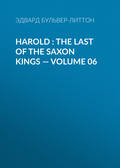
Эдвард Бульвер-Литтон
Godolphin, Complete
CHAPTER XLIX
THE RETURN TO LONDON.—THE ETERNAL NATURE OF DISAPPOINTMENT.—FANNY MILLINGER.—HER HOUSE AND SUPPER
It was in the midst of spring, and at the approach of night, that our travellers entered London. After an absence of some duration, there is a singular emotion on returning to the roar and tumult of that vast city. Its bustle, its life, its wealth—the tokens of the ambition and commerce of the Great Island Race—have something of inconceivable excitement and power, after the comparative desertion and majestic stillness of Continental cities. Constance leaned restlessly forth from the window of the carriage as it whirled on.
“Oh, that I were a man!” said she, fervently.
“And why?” asked Godolphin, smilingly.
“Why! look out on this broad theatre of universal ambition, and read the why. What a proud and various career lies open in this free city to every citizen! Look, look yonder—the old hereditary senate, still eloquent with high memories.”
“And close by it,” said Godolphin, sneering, “behold the tomb!”
“Yes, but the tomb of great men!” said Constance, eagerly.
“The victims of their greatness.”
There was a pause; Constance would not reply, she would scarcely listen.
“And do you feel no excitement, Percy, in the hum and bustle—the lights, the pomp of your native city?”
“Yes; I am in the mart where all enjoyment may be purchased.”
“Ah, fie!”
Godolphin drew his cloak round him, and put up the window.
“These cursed east winds!”
Very true—they are the curse of the country!
The carriage stopped at the stately portico of Erpingham House. Godolphin felt a little humiliated at being indebted to another—to a woman, for so splendid a tenement; but Constance, not penetrating into this sentiment, hastened up the broad stairs, and said, pointing to a door that led to her boudoir,
“In that room cabinets have been formed and shaken.”
Godolphin laughed; he was alive only to the vanity of the boast, because he shared not the enthusiasm; this was Constance’s weak point: her dark eye flashed fire.
There’s nothing bores a man more than the sort of uneasy quiet that follows a day’s journey. Godolphin took his hat, and yawningly stretching himself, nodded to Constance, and moved to the door; they were in her dressing-room at the time.
“Why, what, Percy, you cannot be going out now?”
“Indeed I am, my love.”
“Where, in Heaven’s name?”
“To White’s, to learn the news of the Opera, and the strength of the Ballet.”
“I had just rung for lights to show you the house!” said Constance, disappointed, and half-reproachfully.
“Mercy, Constance! damp rooms and east winds together are too much. House, indeed! what can there be worth seeing in your English drawing-rooms after the marble palaces of Italy? Any commands?”
“None!” said Constance, sinking back into her chair, with the tears in her eyes. Godolphin did not perceive them; he was only displeased by the cold tone of her answer, and he shut the door, muttering to himself—“Was there ever such indelicate ostentation!”
“And thus,” said Constance, bitterly, “I return to England; friendless, unloved, solitary in my schemes and my heart as I was before. Awake, my soul! thou art my sole strength, my sole support. Weak, weak that I was, to love this man in spite of—Well, well, I am not sunk so low as to regret.”
So saying, she wiped away a few tears, and turning with a strong effort from softer thoughts, leaned her cheek on her hand, and gazing on the fire, surrendered herself to the sterner and more plotting meditations which her return to the circle of her old ambition had at first called forth.
Meanwhile Godolphin sauntered into the then arch-club of St. James’s, that reservoir of idle exquisites and kid-gloved politicians. There are two classes of popular men in London; the sprightly, joyous, good-humoured set; the quiet, gentle, sarcastic herd. The one are fellows called devilish good—the other, fellows called devilish gentleman like. To the latter class belonged Godolphin. As he had never written a book, nor set up for a genius, his cleverness was tacitly allowed to be no impediment to his good qualities. Nothing atones for the sin, in the eyes of those young gentlemen who create for their contemporaries reputation, of having in any way distinguished oneself. “He’s such a d—d bore, that man with his books and poetry,” said an arch-dandy of Byron, just after Childe Harold had turned the heads of the women. There happened to be a knot assembled at White’s when Godolphin entered; they welcomed him affectionately.
“Wish you joy, old fellow,” said one. “Bless me, Godolphin! well, I am delighted to see you,” cried another. “So, you have monopolised Lady Erpingham!—lucky dog!” whispered a third.
Godolphin, his vanity soothed by the reception he met with, spent his evening at the Club. The habit begun, became easy—Godolphin spent many evenings at his club. Constance, running the round of her acquaintance, was too proud to complain. Perhaps complaint would not have mended the matter: but one word of delicate tenderness, or one look that asked for his society, and White’s would have been forsaken! Godolphin secretly resented the very evenness of temper he had once almost overprized.
“Oh, Godolphin,” one evening whispered a young lord, “we sup at the little actress’s,—the Millinger; you remember the Millinger? You must come; you are an old favourite, you know: she’ll be so glad to see you,—all innocent, by the way: Lady Erpingham need not be jealous—(jealous! Constance jealous of Fanny Millinger!) all innocent. Come, I’ll drive you there; my cab is at the door.”
“Anything better than a lecture on ambition,” thought Godolphin; and he consented. Godolphin’s friend was a lively young nobleman, of that good-natured, easy, uncaptious temper, which a clever, susceptible, indolent man often likes better than comrades more intellectual, because he has not to put himself out of his way in the comradeship. Lord Falconer rattled on, as they drove along the brilliant streets, through a thousand topics, of which Godolphin heard as much as he pleased; and Falconer was of that age and those spirits when a listener may be easily dispensed with.
They arrived at a little villa at Brompton: there was a little garden round it, and a little bower in one corner, all kept excessively neat; and the outside of the house had just been painted white from top to bottom; and there was a veranda to the house; and the windows were plate-glass, with mahogany sashes—only, here and there, a Gothic casement was stuck in by way of looking “tasty;” and through one window on the ground-floor, the lights shining within, showed crimson silk and gilded chairs, and all sorts of finery—Louis Quatorze in a nutshell! The reader knows the sort of house as well as if he had lived in it. Ladies of Fanny Millinger’s turn of mind always choose the same kind of habitation. It is astonishing what a unanimity of taste they have; and young men about town call it “taste” too, and imitate the fashion in their own little tusculums in Chapel street.
After having threaded a Gothic hall four feet by eight and an oval conservatory with a river-god in the middle, the two visitors found themselves in the presence of Fanny Millinger.
Godolphin had certainly felt no small curiosity to see again the frank, fair, laughing face which had shone on his boyhood, and his mind ran busily back to that summer evening when, with a pulse how different from its present languid tenor, and a heart burning with ardour and the pride of novel independence, the young adventurer first sallied on the world. He drew back involuntarily as he now gazed on the actress: she had kept the promise of her youth, and grown round and full in her proportions. She was extravagantly dressed, but not with an ungraceful, although a theatrical choice: her fair hands and arms were covered with jewels, and that indescribable air which betrays the stage was far more visibly marked in her deportment than when Godolphin first knew her; yet still there was the same freedom as of old, the same joyousness, and good-humoured carelessness in her manner, and in the silver ring of her voice as she greeted Falconer, and turned to question him as to his friend. Godolphin dropped his cloak, and the next moment, with a pretty scream, quite stage-effect, and yet quite natural, the actress had thrown herself into his arms.
“Oh! but I forgot,” said she presently, with a mock salutation of respect, “you are married now; there will be no more cakes and ale. Ah! what long years since we met; yet I have never quite forgotten you, although the stage requires all one’s memory for one’s new parts. Alas! your hair—it was so beautiful, it has lost half its curl, and grown thin. Very rude in me to say so, but I always speak the truth, and my heart warms to see you, so all its thoughts thaw out.”
“Well,” said Lord Falconer, who had been playing with a little muffy sort of dog, “you’ll recollect me presently.”
“You! Oh! one never thinks of you, except when you speak, and then one recollects you—to look at the clock.”
“Very good, Fanny—very good, Fan: and when do you expect Windsor?—He ought to be here soon. Tell me, do you like him really?”
“Like him!—yes, excessively; just the word for him—for you all. If love were thrown into the stream of life, my little sail would be upset in an instant. But in truth, what with dressing, and playing, and all the grave business of life, I am not idle enough to love. And oh, Godolphin, I’m so improved! Ask Lord Falconer, if I don’t sing like an angel, although my voice is hardly strong enough to go round a loo-table; but on the stage, one learns to dispense with all qualities. It is a curious thing, that fictitious existence, side by side with the real one! We live in enchantment, Percy, and enjoy what the poets pretend to.”
The dreaming Godolphin was struck by the remark. He was surprised, also, to see how much Fanny remained the same. A life of gaiety had not debased her.
Tom Windsor came next, an Irishman of five-and-forty, not like his countrymen in aught save wit. Thin, small, shrivelled, but up to his ears in knowledge of the world, and with a jest for ever on his tongue: rich and gay,—he was always popular, and he made the most of his little life without being an absolute rascal. Next dropped in the handsome Frenchman De Damville; next, the young gambler, St. John; next two ladies, both actresses; and the party was complete.
The supper was in keeping with the house; the best wines, excellent viands—the actress had grown rich. Wit, noise, good-humour, anecdote, flashed round with the champagne; and Godolphin, exhilarated into a second youth, fancied himself once more the votary of pleasure.
CHAPTER L
GODOLPHIN’S SOLILOQUY.—HE BECOMES A MAN OF PLEASURE AND A PATRON OF THE ARTS.—A NEW CHARACTER SHADOWED FORTH; FOR AS WE ADVANCE, WHETHER IN LIFE OR ITS REPRESENTATIONS, CHARACTERS ARE MORE FAINT AND DIMLY DRAWN THAN IN THE EARLIER PART OF OUR CAREER
“Yes,” said Godolphin, the next morning, as he soliloquised over his lonely breakfast-table—lonely, for the hours of the restless Constance were not those of the luxurious and indolent Godolphin, and she was already in her carriage, nay, already closeted with an intriguing ambassadress—“yes, I have passed two eras of life—the first of romance, the second of contemplation; once my favourite study was poetry—next philosophy. Now, returned to my native country, rich, settled, yet young, new objects arise to me; not that vulgar and troublous ambition (which is to make a toil of life) that Constance suggests, but a more warm and vivid existence than that I have lately dreamed away. Let luxury and pleasure now be to me what solitude and thought were. I have been too long the solitary, I will learn to be social.”
Agreeably to this resolution, Godolphin returned with avidity to the enjoyment of the world; he found himself courted, he courted society in return. Erpingham House had been for years the scene of fascination: who does not recollect the yet greater refinement which its new lord threw over its circles? A delicate and just conception of the fine arts had always characterised Godolphin. He now formed that ardour for collecting, common to the more elegant order of minds. From his beloved Italy he imported the most beautiful statues—his cabinets were filled with gems—his walls glowed with the triumphs of the canvas—the showy but heterogeneous furniture of Erpingham House gave way to a more classic and perfect taste. The same fastidiousness which, in the affairs of the heart, had characterised Godolphin’s habits and sentiments, characterised his new pursuits; the same thirst for the Ideal, the same worship of the Beautiful, and aspirations after the Perfect.
It was not in Constance’s nature to admit this smaller ambition; her taste was pure but not minute; she did not descend to the philosophy of detail. But she was glad still to see that Godolphin could be aroused to the discovery of an active object; and, although she sighed to perceive his fine genius fritted away on the trifles of the virtuoso—although she secretly regretted the waste of her great wealth (which afforded to political ambition so High an advantage) on the mute marble, and what she deemed, nor unjustly, frivolous curiosities—she still never interfered with Godolphin’s caprices, conscious that, to his delicacy, a single objection to his wishes on the score of expense would have reminded him of what she wished him most to forget—viz., that the means of this lavish expenditure were derived from her. She hoped that his mind, once fairly awakened, would soon grow sated with the acquisition of baubles, and at length sigh for loftier objects; and, in the meanwhile, she plunged into her old party plots and ambitions intrigues.
Erpingham House, celebrated as ever for the beauty of its queen and for the political nature of its entertainments, received a new celebrity from its treasures of art, and the spiritual wit and grace with which Godolphin invested its attractions. Among the crowd of its guests there was one whom its owners more particularly esteemed—Stainforth Radclyffe was still considerably under thirty, but already a distinguished man. At school he had been distinguished; at college distinguished, and now in the world of science distinguished also. Beneath a quiet, soft, and cold exterior, he concealed the most resolute and persevering ambition; and this ambition was the governing faculty of his soul. His energies were undistracted by small objects; for he went little into general society, and he especially sought in his studies those pursuits which nerve and brace the mind. He was a profound thinker, a deep political economist, an accurate financier, a judge of the intricacies of morals and legislation—for to his mere book studies he added an instinctive penetration into men; and when from time to time he rejoined the world, he sought out those most distinguished in the sciences he had cultivated, and by their lights corrected his own. In him there was nothing desultory or undetermined; his conduct was perpetual calculation. He did nothing but with an eye to a final object; and when, to the superficial, he seemed most to wander from the road their prudence would have suggested, he was only seeking the surest and shortest paths. Yet his ambition was not the mere vulgar thirst for getting on in the world; he cared little for the paltry place, the petty power which may reward what are called aspiring young men. His clear sight penetrated to objects that seemed wrapped in shade to all others; and to those only—distant, but vast and towering,—he deigned to attach his desires. He cared not for small and momentary rewards; and while always (for he knew its necessity) uppermost on the tide of the hour, he had neither joy nor thought for the petty honours for which he was envied, and by which he was supposed to be elated. Always occupied and always thoughtful, he went, as I have just said, very little into the gay world, and was not very well formed to shine in it when there; for trifles require the whole man as much as matters of importance. He did not want either wit or polish, but he tasked his powers too severely on great subjects not to be sometimes dull upon small ones: yet, when he was either excited or at home, he was not without—what man of genius is?—his peculiar powers of conversation. There was in this young dark, brooding, stern man, that which had charmed Constance at first sight; she thought to recognise a nature like her own, and Radclyffe’s venturous spirit exulted in a commune with hers. Their politics were the same; their ultimate ends not very unlike; and their common ambition furnished them with an eternity of topics and schemes. Radclyffe was Constance’s guest;—but Godolphin soon grew attached to the young politician, though he shrugged his shoulders at his opinions. In youth, Godolphin had been a Tory—now, if anything, he was a Tory still. Such a political creed was perhaps the natural result of his philosophical belief. Constance, Whig by profession, ultra-Liberal in reality, still however gave the character to the politics of the house; and the easy Godolphin thought politics the veriest of all the trifles which a man could leave to the discretion of the lady of his household. We may judge, therefore, of the quiet, complacent amusement he felt in the didactics of Radclyffe or the declamations of Constance.
“That is a dangerous, scheming woman, believe me,” said the Duchess of – to her great husband, one morning, when Constance left her Grace.
“Nonsense! women are never dangerous.”
CHAPTER LI
GODOLPHIN’S COURSE OF LIFE.—INFLUENCE OF OPINION AND OF RIDICULE ON THE MINDS OF PRIVILEGED ORDERS.—LADY ERPINGITAM’S FRIENDSHIP WITH GEORGE THE FOURTH.—HIS MANNER OF LIVING
The course of life which Godolphin now led, was exactly that which it is natural for a very rich intellectual man to indulge—voluptuous but refined. He was arriving at that age when the poetry of the heart necessarily decays. Wealth almost unlimited was at his command; he had no motive for exertion; and he now sought in pleasure that which he had formerly asked from romance. As his faculties and talents had no other circle for display than that which “society” affords; so by slow degrees, society—its applause and its regard—became to him of greater importance than his “philosophy dreamt of.” Whatever the circle we live amongst, the public opinion of that circle will, sooner or later, obtain a control over us. This is the reason why a life of pleasure makes even the strongest mind frivolous at last. The lawyer, the senator, the magi of letters, all are insensibly guided—moulded—formed—by the judgment of the tribe they belong to, and the circle in which they move. Still more is it the case with the idlers of the great world, amongst whom the only main staple of talk is “themselves.”
And in the last-named set, Ridicule being more strong and fearful a deity than she is amongst the cultivators of the graver occupations of life, reduces the inmates, by a constant dread of incurring her displeasure, to a more monotonous and regular subjection to the judgment of others. Ridicule is the stifler of all energy amongst those she controls. After man’s position in society is once established—after he has arrived at a certain age—he does not like to hazard any intellectual enterprise which may endanger the quantum of respect or popularity at present allotted to him. He does not like to risk a failure in parliament—a caustic criticism in literature: he does not like to excite new jealousies, and provoke angry rivals where he now finds complaisant inferiors. The most admired authors, the most respected members of either house, now looked up to Godolphin as a man of wit and genius; a man whose house, whose wealth, whose wife, gave him an influence few individuals enjoy. Why risk all this respect by provoking comparison? Among the first in one line, why sink into the probability of being second-rate in another?
This motive, which secretly governs half the aristocracy—the cleverer half, viz., the more diffident and the more esteemed; which leaves to the obtuse and the vain, a despised and unenviable notoriety; added new force to Godolphin’s philosophical indifference to ambition. Perhaps, had his situation been less brilliant, or had he persevered in that early affection for solitude which youth loves as the best nurse to its dreams, he might now, in attaining an age when ambition, often dumb before, usually begins to make itself heard, have awakened to a more resolute and aspiring temperament of mind. But, as it was, courted and surrounded by all the enjoyments which are generally the reward to which exertion looks, even an ambitious man might have forgotten his nature. No wound to his vanity, no feeling that he was underrated (that great spur to proud minds) excited him to those exertions we undertake in order to belie calumny. He was “the glass of fashion,” at once popular and admired; and his good fortune in marrying the celebrated, the wealthy, the beautiful Countess of Erpingham was, as success always is, considered the proof of his genius, and the token of his merits.
It was certainly true, that a secret and mutual disappointment rankled beneath the brilliant lot of the husband and wife. Godolphin exacted from Constance more softness, more devotion, more compliance than belonged to her nature; and Constance, on the other hand, ceased not to repine that she found in Godolphin no sympathy with her objects, and no feeling for her enthusiasm. As there was little congenial in their pursuits, the one living for pleasure, the other for ambition, so there could be no congeniality in their intercourse. They loved each other still; they loved each other warmly; they never quarrelled; for the temper of Constance was mild, and that of Godolphin generous: but neither believed there was much love on the other side; and both sought abroad that fellowship and those objects they had not in common at home.
Constance was a great favourite with the reigning king; she was constantly invited to the narrow circle of festivities at Windsor. Godolphin, who avoided the being bored as the greatest of earthly evils, could not bow down his tastes and habits to any exact and precise order of life, however distinguished the circle in which it became the rule. Thirsting to be amused, he could not conjugate the active verb “to amuse.” No man was more fitted to adorn a court, yet no man could less play the courtier. He admired the manners of the sovereign,—he did homage to the natural acuteness of his understanding; but, accustomed as he was to lay down the law in society, he was too proud to receive it from another,—a common case among those who live with the great by right and not through sufferance. His pride made him fear to seem a parasite; and, too chivalrous to be disloyal, he was too haughty to be subservient. In fact, he was thoroughly formed to be the Great Aristocrat,—a career utterly distinct from that of the hanger-on upon a still greater man; and against his success at court, he had an obstacle no less in the inherent fierte of his nature, than in the acquired philosophy of his cynicism.
The king, at first, was civil enough to Lady Erpingham’s husband; but he had penetration enough to see that he was not adequately admired: and on the first demonstration of royal coolness, Godolphin, glad of an excuse, forswore Castle and Pavilion for ever, and left Constance to enjoy alone the honours of the regal hospitality. The world would have insinuated scandal; but there was that about Constance’s beauty which there is said by one of the poets to belong to an angel’s—it struck the heart, but awed the senses.







